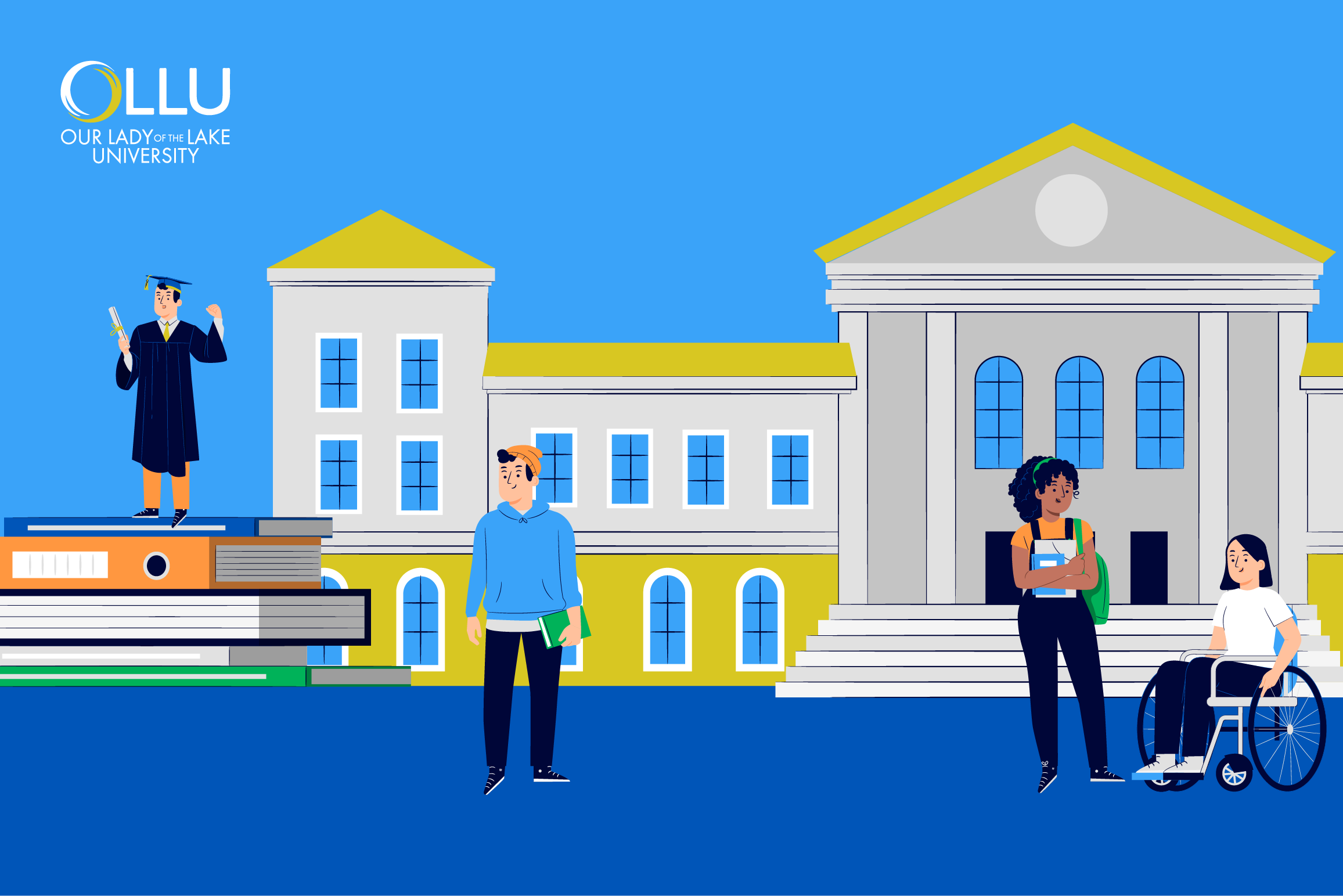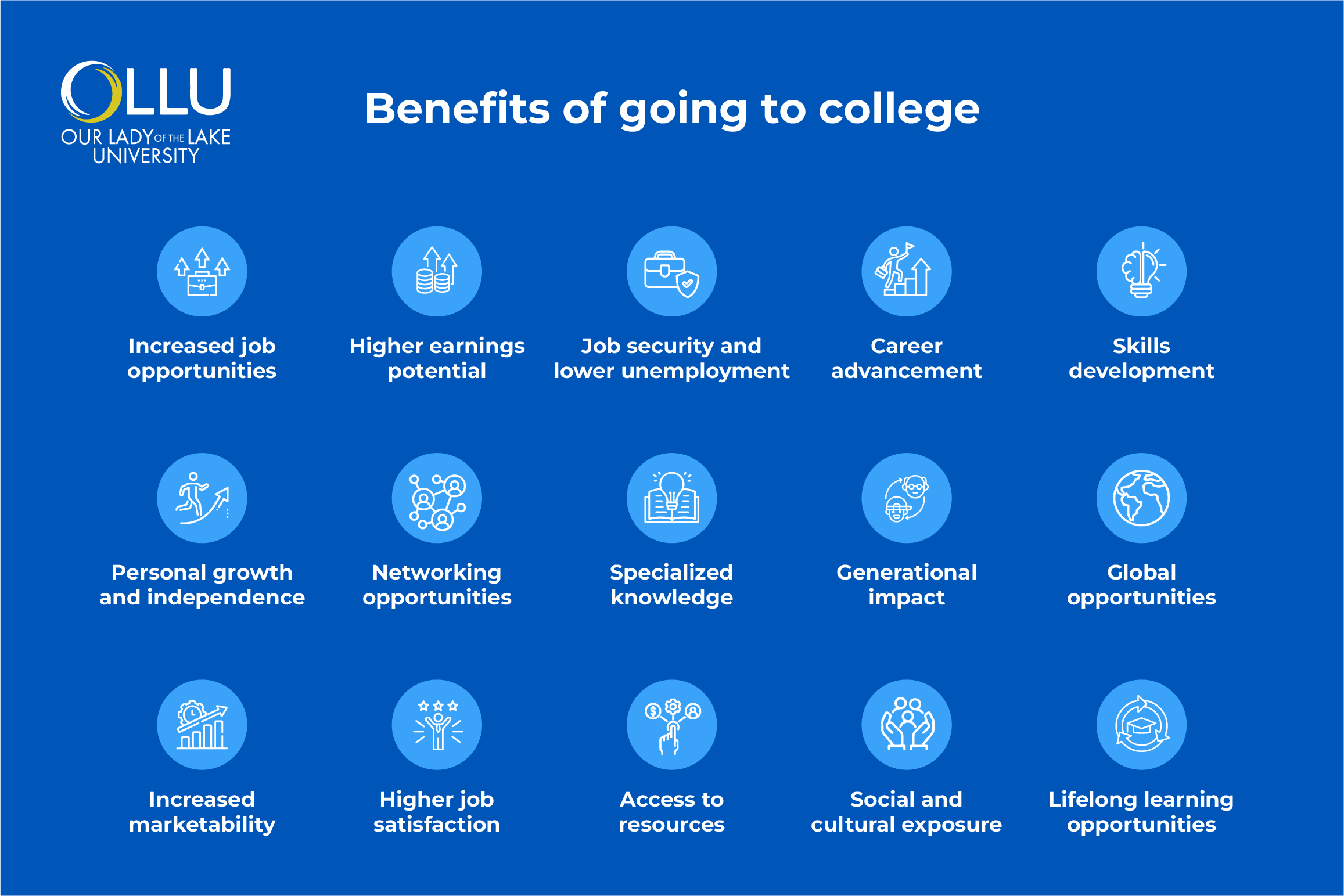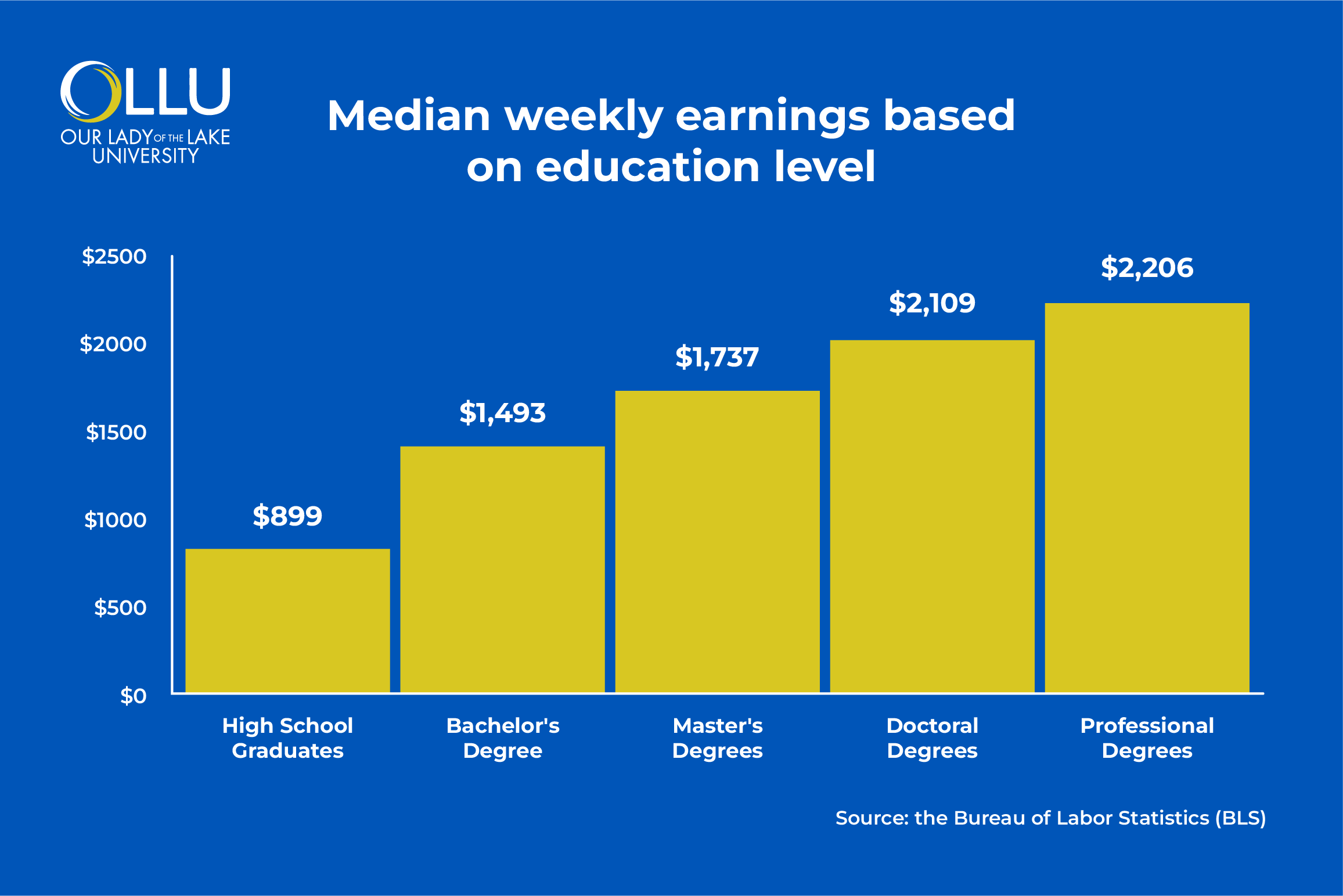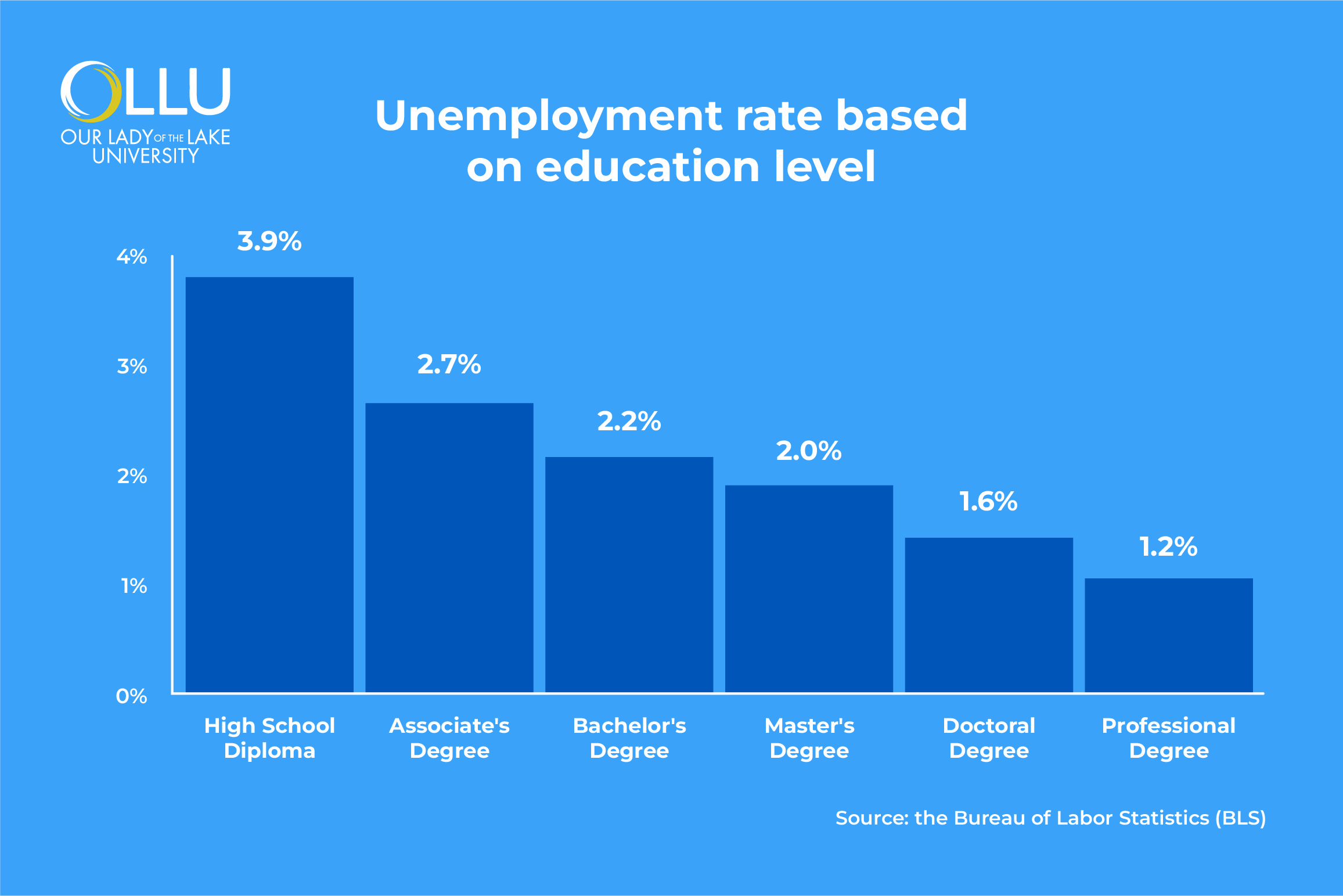15 Key Benefits of Going to College and Building Your Future
Jan 23, 2025

-
Going to college has many benefits, including better job opportunities, higher earning potential, personal growth, and access to a network that can support your career goals.
-
To prepare for college, research your school and program, plan your finances, organize necessary paperwork, and familiarize yourself with campus resources and expectations.
-
To choose the best program for yourself, consider your interests, strengths, career goals, and the skills you want to develop.
In its beginnings, higher education was a privilege reserved for the wealthy, with colleges and universities few and far between. For centuries, women were largely excluded from attending. It wasn't until the 19th century that women began to gain access to higher education, and even then, it remained out of reach for most. Even though things had improved, only 7.7% of Americans had completed college by 1960. This is in contrast to recent years, when that percentage has increased to 37.7%.
For many who had no chance before, the growth of colleges and universities and universal access to education have created opportunities. This increase in enrollment indicates that more people are now aware of the many advantages of attending college.
Benefits of Going to College

Deciding whether to commit to years of education can be a difficult choice, especially when considering the rising cost of tuition and the time investment involved. For many, the challenges can be a source of discouragement from pursuing a college degree.
However, when you look beyond the obstacles, the benefits of attending college are quite clear and convincing. So, for many others, they far outweigh the challenges, making that choice between attending or not a no-brainer.
So, what are the benefits of going to college? From better job opportunities to personal growth, the answer to that question lies in the following 15 advantages:
1. Increased job opportunities
College degrees and higher education, in general, help expand your career opportunities. Having a degree shows employers that you've acquired the skills and knowledge needed to fulfill your duties in whatever role you have.
Nowadays, many employers require certain degrees for positions that would have been available to high school graduates just a few decades ago.
2. Higher earnings potential

It's widely known that education pays off when it comes to earning potential. According to data from the Bureau of Labor Statistics (BLS), the median weekly earnings based on education are as follows:
-
$899 for high school graduates
-
$1,493 for those with a bachelor's degree
-
$1,737 for those with master's degrees
-
$2,109 for those with doctoral degrees
-
$2,206 for those with professional degrees
These earnings translate into improved quality of life. With higher earnings, you can afford a better standard of living, invest in your future, and even support your family more comfortably.
3. Job security and lower unemployment

Education also offers greater job security. The unemployment rate is 2.2% for people with a bachelor's degree and 3.9% for those with only a high school diploma.
Additionally, the unemployment rate decreases with increasing education. For example, the unemployment rate for those with a doctoral or professional degree is just 1.6%, indicating that advanced education provides a strong buffer against job loss.
In practice, this means that college graduates have a higher chance of retaining their jobs during recessions or finding new employment quickly during difficult times.
4. Career advancement
A college degree, usually an undergraduate one, is needed to enter the job market for many industries, but it can also help you advance in your career. Many companies and industries require advanced degrees to move up the corporate ladder.
For example, in business or healthcare, for roles like CEO or healthcare administrator, an advanced degree like a Master of Business Administration (MBA) or a Master's in Public Health (MPH) may be necessary.
5. Skills development
College is largely successful because of the variety of skills it helps students acquire. Critical thinking, communication, problem-solving, teamwork, and time management are some of these abilities, along with program- and field-specific skills.
These skills are directly transferable to the workplace, where employers value employees who can work well with others, handle multiple tasks, and approach problems analytically.
Through coursework, assignments, and extracurricular activities, college graduates gain the kind of well-rounded skill set that makes them valuable assets to employers.
6. Personal growth and independence
You've probably had at least one person tell you that college is a time for finding out who you are. That's generally true and one of the top personal benefits of going to college, as it provides an environment where you can mature both personally and academically.
For many, it's their first time living away from home, managing their own schedules, and making independent decisions. This sense of freedom helps them work on themselves and develop confidence, responsibility, and decision-making skills.
7. Networking opportunities
College is also one of the best places for you to start building a professional network. Through interactions with professors, peers, alumni, and industry professionals, students can form connections that benefit their future careers.
Many colleges host career fairs, networking events, and guest lectures in order to give students direct access to potential employers. These connections can lead to internships, mentorships, and even direct job offers.
8. Specialized knowledge
Colleges offer many different programs in various fields and focus on specific subjects. This allows students to gain in-depth knowledge in the field of their choice and provides the specialized training needed to succeed in these industries.
For example, a computer science degree gives students the expertise required to work as a software developer, while a nursing degree prepares individuals to enter the healthcare profession. The programs' emphasis and specialized knowledge enable students to enter the workforce with the required credentials.
9. Generational impact
A college degree can have a lasting impact on families. Research has shown that children of college graduates are more likely to attend college themselves, continuing the cycle of education and opportunity.
This generational impact helps break the cycle of poverty and creates upward mobility for families. College graduates are also more likely to make informed financial and healthcare decisions, improving the overall well-being of their families.
10. Global opportunities
In today's world, almost everything is connected in some way. Therefore, a college degree can open up opportunities to work internationally.
Many global companies prefer employees with higher education, especially for roles that require specialized knowledge. With a degree, you can pursue career opportunities abroad, experience different cultures, and work in international business, diplomacy, or academia.
11. Increased marketability
A college degree is generally regarded by employers as a mark of reliability and commitment when considering job applicants. So, a degree makes you more marketable when applying for jobs.
Being college-educated shows that you commit to growth, have the drive to succeed, and are disciplined when it comes to completing a challenging program. It adds credibility to your resume and helps you market yourself for whichever role you're seeking.
12. Higher job satisfaction
Studies consistently show that college graduates are more likely to be satisfied with their jobs. A study on the public's views on the value of education showed that half of all employed college graduates in their mid-20s and early 30s claimed to be "very satisfied" with their jobs. On the other hand, only 37% of Millennials, who only have a high school diploma or less, claim to be satisfied with their jobs.
This may be due to the fact that more education frequently results in more fulfilling employment with higher compensation. For example, individuals with a degree may be more likely to work in roles that align with their interests or passions, leading to greater job satisfaction in the long run.
13. Access to resources
As institutions of higher learning, colleges give students access to a multitude of resources that can support their academic and professional success. These resources may include libraries, research facilities, career guidance counseling, academic advising, and internship opportunities.
Students also gain access to a network of alumni who can help them through guidance and job leads.
14. Social and cultural exposure
College campuses tend to be quite diverse. Therefore, in a way, college also offers students the chance to interact with individuals from different backgrounds and cultures.
This exposure can help broaden one's understanding of the world as they gain a better understanding of the global community.
15. Lifelong learning opportunities
Lastly, college, for many, instills a love for learning that lasts a lifetime. Graduates who are more acquainted with academia and the habit of learning and researching as part of their day-to-day responsibilities are more likely to continue that path and further their education, whether through additional degrees, certifications, or personal study.
This lifelong learning helps them stay competitive by learning about new trends and innovations.
How to Prepare for College
While it is true that college is a time for education, self-discovery, and growth, you should be well-prepared to get the most out of this experience. If you do not know what to anticipate and what is expected of you, it can all be too much to handle.
Some things you can do to prepare for college include:
-
Researching the school’s academic offerings, campus culture, and support systems
-
Preparing a budget for the tuition, room, textbooks, and other expenses
-
Exploring scholarships, grants, and student loans
-
Organizing all the necessary paperwork, like acceptance letters, transcripts, and financial aid forms
-
Taking some time to learn about campus facilities such as libraries, academic advising offices, and career services
-
Setting clear academic and personal goals
-
Creating a support system with family, friends, or online communities
-
Mentally preparing yourself for the transition, the emotional and social changes of your life
-
Packing and planning the move (if applicable)
Choose the Best Degree
The best degree for you is not determined by whether it's offered by the most prestigious college or is considered a difficult and impressive program. The choice is about finding an option that suits you and aligns with your long-term goals, one that fits your interests, strengths, and aspirations.
In order to find the best degree option for yourself, you should:
-
Choose a degree that excites and motivates you.
-
Consider your strengths in certain subjects and see which programs suit those strengths.
-
Consider the career opportunities available within your field of interest.
-
Look into the median incomes associated with the degree while keeping in mind that passion and job satisfaction also play a significant role in long-term fulfillment.
-
Think about the kind of lifestyle you want to lead and how a certain degree may affect that.
Conclusion
The value of college lies not in the degree you receive at the end, but in everything you do to increase your knowledge, hone your abilities, and position yourself for a bright future. Your experience will be unique because, today, there are countless colleges offering a wide range of programs, ensuring that there's something for everyone. No one has to fit into a single mold. As long as you're dedicated and willing to put in the effort, you'll discover a path that aligns with your passions and aspirations.
At OLLU, we offer a variety of majors and programs designed to provide you with a great college experience while helping you achieve all the benefits we've discussed. With us, your future is something we help you create every single day, not just something to look forward to.
Frequently Asked Questions
What are the pros of a 4-year college?
A 4-year college provides a thorough education encompassing specialized knowledge as well as the hands-on experience needed to develop important soft skills like critical thinking, communication, and problem-solving.
Is it better to go to college or get a job?
That depends on your circumstances and goals. College typically offers long-term benefits such as higher earning potential, job security, and career advancement. However, for some, gaining work experience immediately may be more beneficial, particularly if they have clear career goals that don't require a degree.
How do I know if college is for me?
To know if college is right for you, consider whether your desired career requires a degree or specialized education. If you're unsure about what you want to pursue, college can still be a great option since it gives you the chance to explore different fields and find the right fit for your interests and goals.
How hard is life without college?
Life without a college degree can be quite challenging since many jobs today require some level of higher education. Without a degree, you may have fewer career opportunities and lower earning potential.